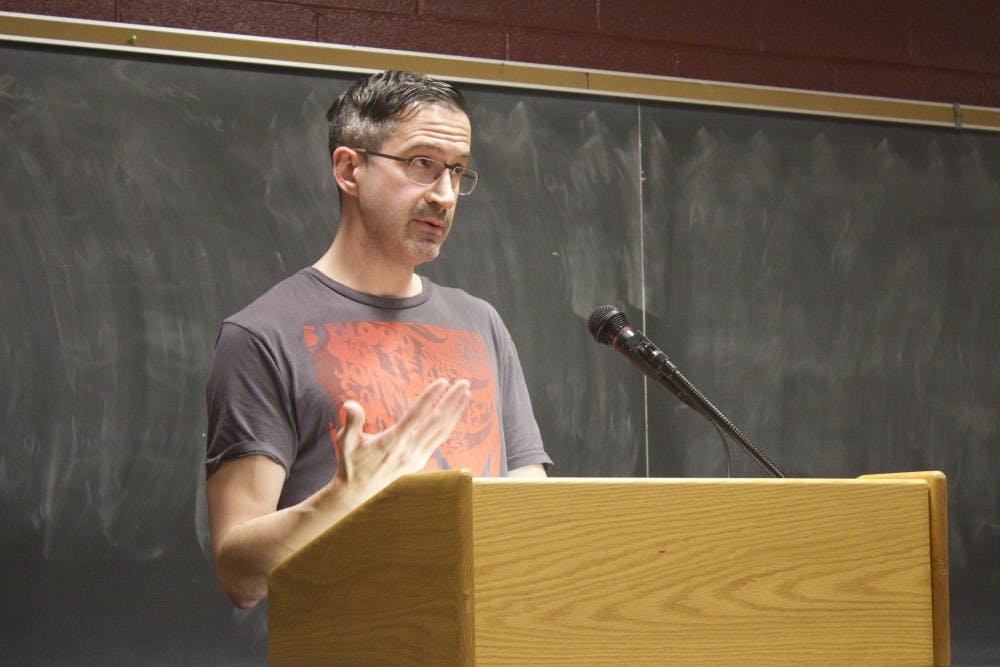Hunched over and scribbling in their notebooks in Dauphin Humanities Center (DHC) 051, students listened to English professor William Harris read from his newly published book, “Slouching Toward Gaytheism: Christianity and Queer Survival in America.”
Thursday, Nov. 13, Harris started the event by reading from the book’s introduction. Between bites of text, Harris looked up from his work to explain a particular word or phrase, which often resulted in mild laughter from the audience.
“My use of the term ‘gaytheism,’ far from advocating that queers turn to religion, ‘theism,’ invites gays to opt for atheism so as to opt out of religious ideology and the damage that so-called ‘moral clout’ continues to inflict on queer Americans,” Harris read from his book.
The idea of “gaytheism” encourages queer people to believe in themselves rather than a religious authority to make them whole, Harris said.
In writing his book, Harris examined sociological studies, news articles, books and Christian purity manuals.
“Slouching Toward Gaytheism: Christianity and Queer Survival in America” analyzes both conservative and liberal Christian ideology and its “heteronormative” structure. That is to say, the idea that everyday reality is saturated with outlines of heterosexual life.
Through reading the purity manuals, Harris discovered that there was a blind spot for men — purity balls.
Initially, Harris thought about writing an article solely on purity balls — a ceremony in which a father vows to protect his daughter’s virginity and gives her a purity ring. Harris described the purity ball as a “fetishized” ceremony.
Traditionally, the girl keeps her purity ring until she is married, at which point her father removes the ring and gives it to the daughter’s new husband. Harris noted this was symbolic of passing a woman from one man to another.
From his research, Harris did not find any equivalent ceremony for sons and mothers.
The idea of writing an article on purity balls evolved into a whole chapter of Harris’ book. He simply kept writing until the “kick” was gone.
“I found it very interesting to hear more about the process of writing the book,” sophomore psychology major, Jaime Bowder, said.
Bowder came to Harris’ reading with her sticky-noted Gaytheism book in hand and questions at the ready.
“There were definitely a lot of questions that I had throughout the book that he actually answered today,” Bowder said.
Aside from the purity balls, Harris examined purity manuals in-depth. These texts seem to encourage male sexuality, according to Harris.
During the discussion on Thursday, Harris’ jokes about the purity manuals kept the audience laughing. When quoting from a particular text on the topic of wet dreams being God’s “natural release valve” to prevent masturbation, Harris joked that a wet dream must then be a “hand job from the Holy Spirit.”
In reading the purity manuals, Harris found that male homosexuality was treated as something that could be cured through therapy and religion. Female homosexuality is a topic that Harris did not encounter in reading the purity manuals.
As the event wound down in DHC, Harris read from his book’s conclusion before taking questions from the audience.
Part of the inspiration for the book came from social injustices Harris has witnessed. “We’re still having to argue about queer people’s basic humanities,” Harris said during the question and answer period.
Harris hopes that his latest book will allow people to understand religion’s position on being queer and encourage “humanism” rather than hatred.





The Slate welcomes thoughtful discussion on all of our stories, but please keep comments civil and on-topic. Read our full guidelines here.